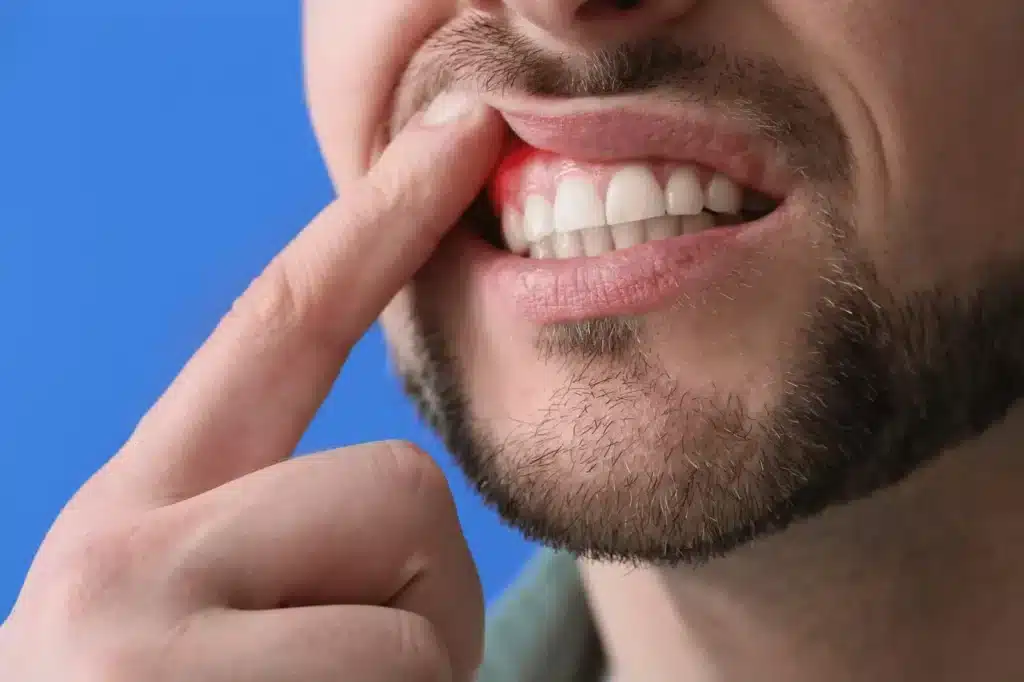Are you aware of the influence of smoking on oral health? Read to know the harmful effect of smoking on oral health.
People who smoke are at a higher risk of having problems with their gums, losing their teeth, facing complications after tooth removal or mouth surgery, and developing mouth cancer. They’re also more likely to get infections and don’t heal as well as non-smokers.
Quitting smoking is good because it lowers the risk of gum disease and mouth cancer and helps with gum treatment. You stay safe from the effect of smoking on oral health by avoiding it.
If you smoke or vape, you must see your dentist regularly. Check for symptoms of mouth cancer and take care of your oral health.
Smoking and Signs of Gum Disease
There are signs to notice the effect of smoking on oral health:
- Gums that are red, puffy, and bleed when you brush them.
- Pus is coming out from your gums.
- Gums that are moving away from your teeth and making them unsafe.
- Having bad taste in your mouth or bad breath.
- Your teeth feeling loose can change how your bite feels or affect the fit of dentures.
- Gaps form between your teeth.
Oral Diseases Due To Smoking
Smoking can harm your mouth in many ways. The effect of smoking on oral health is harmful. Some of these problems are obvious, but many are very concerning.
Stained Teeth, Bad Breath, Loss of Smell and Taste: Smoking can make you lose your sense of smell and taste and turn your teeth yellow. It also gives you bad breath.
Weakened Immune System: When you smoke, your body’s defense system weakens. This means you’re more likely to get oral diseases, and it takes longer for your mouth to heal after dental surgery.
Gum and Periodontal Disease: If you smoke, you’re twice as likely to get gum disease, which can cause gum diseases.
Tooth Decay and Loss: Smoking helps harmful things build up on your teeth, like bacteria, plaque, and tartar. It can lead to tooth cavities, tooth decay, and tooth loss.
Mouth Sores and Ulcers: Smokers often have more mouth sores and ulcers, which are painful and can be bothersome.
Gum Recession: Gum disease from smoking can cause gum recession. It makes it harder to care for your teeth and change their appearance.
Oral Cancer: Smoking exposes your mouth to dangerous chemicals. This can change healthy cells and cause oral cancer. Oral cancer is a severe effect of smoking on oral health.
Smoking and Gum Disease
Smoking can lead to gum diseases. A gum disease is caused by an infection that eats the bone holding your teeth in your mouth. The infection starts when tiny things like bacteria and food bits build up on your teeth and gums.
If you don’t clean the plague, it changes into a hard substance called calculus or tartar. Tartar can damage the gums around your teeth, especially if you smoke.
There are two stages of gum disease:
- Gingivitis
- Periodontitis

If you don’t treat periodontitis, it can damage the parts that keep your teeth in place. Your teeth might fall out independently, or a dentist might have to remove them.
A weak immune system is also an effect of smoking on oral health. Smoking can make your body’s defense system weaker. It makes it harder to fight off gum infections. When your gums are damaged, smoking also slows down the healing process.
Risks
The effect of smoking on oral health damages your overall health as well. Here are the risks if you’re a smoker:
- You are twice as likely to get gum disease as someone who doesn’t smoke.
- You have a higher chance of getting gum disease.
- The longer you smoke, the more at risk you are for gum disease.
- The treatments might not work if you have gum disease and smoke.
- It doesn’t matter if you smoke cigarettes, use pipes, or smokeless (spit) tobacco. All of them raise your risk of getting gum disease.
How to Quit Smoking
Avoiding smoking is challenging, but it can be done with hard wok. The Centers for Disease Control has lots of helpful information about quitting, such as tips, strategies, and staying smoke-free.
They also have a simple 5-step plan to help you quit and stay safe from the effect of smoking on oral health:
- Pick a date when you’ll stop smoking.
- Ask for help from your friends, family, and healthcare professionals.
- When you want to smoke, do something else to distract yourself. Going for a walk or enjoying a hobby can help.
- Talk to your doctor about using medicines that can help you quit, whether prescription or over-the-counter.
- It’s okay if you slip up and smoke again. It happens to many people. It is essential to acknowledge it, keep trying, and don’t give up. Keep moving forward.

Conclusion
The effect of smoking on oral health is dangerous and causes many diseases. Always go for regular dental checkups to protect yourself from severe infections. Try quitting smoking because it harms your oral and overall health.


